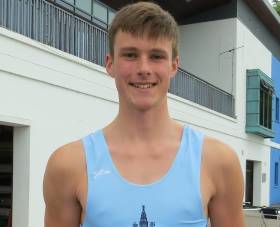Displaying items by tag: All Ireland Youth Regatta
O'Donovans and Puspure Add Lustre as McCarthy and Cremen Start Season with Wins [UPDATE]
#Rowing: A big and enthusiastic crowd greeted rowers from the Ireland World Championships team at the National Rowing Centre today. Aifric Keogh and Emily Hegarty, who reached the final of the women’s pair, joined gold medallists Sanita Puspure, Paul O’Donovan and Gary O’Donovan.
The Minister of State with responsibility for Sport, Brendan Griffin, told the rowers and the crowd that he was fighting for funding at cabinet level, while the Cork County Mayor, Patrick Gerard Murphy, made an eloquent speech about how the present team inspire others.
Outside, the All Ireland Youth and Irish Open Regatta reflected the enthusiasm and ambition of the contenders for top spots. Lee woman Margaret Cremen was a convincing winner of the single sculls, while Fintan McCarthy – who was exempt, as he had competed at the World Championships – went ahead and won the men’s single.
Earlier Jack Dorney of Shandon and Aoife Lynch of Lee won the junior singles.
Irish Open Regatta, National Rowing Centre, Cork, September 29th
Men
Four: UCD (senior). Under-23: Coláiste Iognáid (jun).
Pair: NUIG (D Buckley, E Whittle; sen). Under-23: UCD. Jun: Commercial.
Sculling
Double: St Michael’s/UCC (sen). Under-23: Three Castles (jun)
Single: Skibbereen (F McCarthy; sen). Under-23: Queen’s (M Taylor). Jun: Enniskillen (O Donaghy)
Women
Four: Colaiste Iognaid A (jun)
Pair: UCC/Skibbereen (T Hanlon, N Casey; sen). U-23: Bann/Neptune. Jun: St Michael’s A.
Sculling
Double: Neptune/Bann (sen). U-23: Killorglin (jun).
Single: UCC (M Cremen, Under-23). NUIG (O’Connor; first senior). Jun: Lee (A Lynch).
Youth Regatta (Selected)
Men
Sculling, Quadruple, Junior 16, coxed: St Michael’s. Single, Jun 16: Kenmare (Kelly)
Women
Sculling, Quadruple, Junior 16, coxed: St Michael’s. Single, Jun 16: Lee Valley (Davis)
Dorney and Lynch top Junior Rankings at All Ireland Open and Youth Regatta
Jack Dorney of Shandon won the junior 18 single sculls at the Irish Open and All Ireland Junior Regatta at the National Rowing Centre in Cork today. His nearest rival was James O’Donovan of Castleconnell. Both represented Ireland this season and both are junior again for the 2019 season.
Aoife Lynch of Lee was the top junior woman, just ahead of Lauren O’Brien of Castleconnell.
The best women’s open pair of the day was the UCC/Skibbereen combination of Tara Hanlon and Niamh Casey.





























































